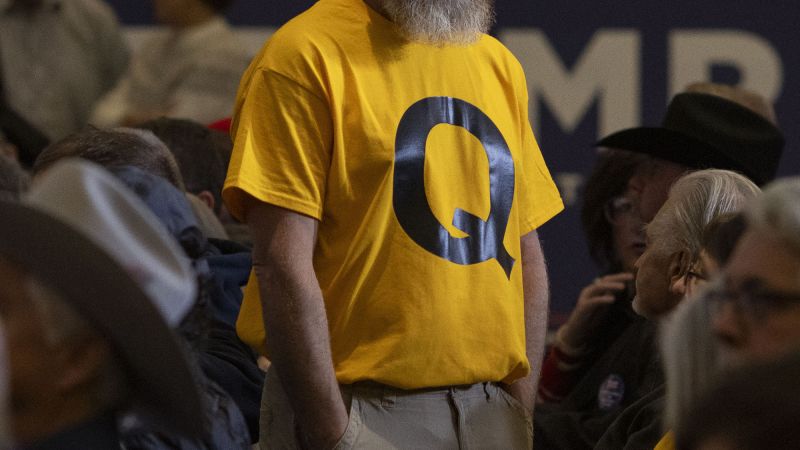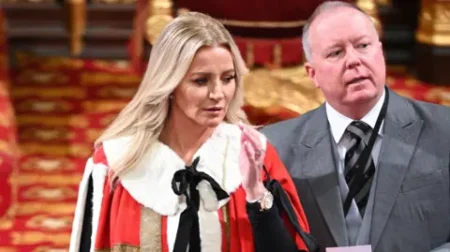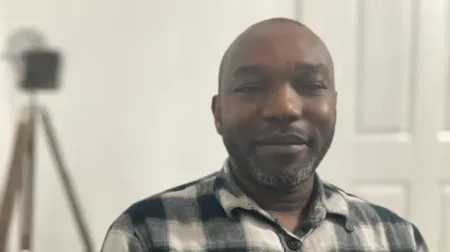On a Saturday afternoon in October 2020, a notable event took place in a small hotel conference room situated just outside Phoenix, Arizona. The atmosphere was charged with excitement, reflecting the fervent beliefs shared among the gathering of individuals. Among them was a gentleman adorned with a distinctive and elaborate headpiece, whose scoffing and grunting greeted my entrance into the room—a stark contrast to the mask I was wearing. This was the pinnacle of the COVID-19 pandemic, and in a crowd of about 60 people, I was one of the few who believed in the seriousness of the virus; many around me were skeptical, dismissing the very existence of COVID-19.
The crowd erupted in cheers as a clip featuring President Donald Trump played on a television positioned at the front of the room. This footage was fresh, having aired merely 48 hours prior during an NBC News interview with Savannah Guthrie. In the clip, Trump was posed a critical question regarding whether he would disavow the conspiracy theory known as QAnon. In a moment that would echo throughout his base, Trump declined to renounce QAnon, insisting that he knew little about the movement yet acknowledged that “they are very much against pedophilia.” Furthermore, he had previously remarked that QAnon followers were “people that love our country.”
This refusal to distance himself from the conspiracy theory sparked jubilation among the attendees at QCon, a convention dedicated to QAnon followers staged just weeks before the 2020 presidential election. Many of the participants were ardent supporters of Trump, deeply submerged in the convoluted narratives spun by QAnon, which posits that a shadowy cabal of elite pedophiles exerts control over the government. This conspiracy narrative took shape following the inaugural post by the anonymous figure known as Q in 2017. A notorious component of the QAnon theory is centered around Jeffrey Epstein, a convicted sex offender and accused trafficker, whose connections to Democratic politicians were heavily scrutinized in Q’s postings.
The crowd’s enthusiasm at the conference stemmed from their conviction that Trump’s comments constituted an implicit endorsement of their beliefs. Having created a significant fan base that deciphered hidden messages in his public statements, they perceived his lack of disavowal as an affirmation of their trust in the conspiracy.
Following the conference, Trump would continue to engage with QAnon narratives, posting memes laden with QAnon symbols and endorsing accounts promoting these theories on his social media platform, Truth Social, over a thousand times since 2022, as per an investigation by the liberal organization Media Matters. In the eyes of QAnon adherents, Trump’s engagement represented numerous affirmations of a fantastical narrative—often revolving around Epstein.
However, Trump’s recent dismissal of questions from his base regarding the so-called “Epstein files” sparked surprise among devoted supporters of QAnon and the MAGA movement. This marked a departure from his previous responsiveness to their desires. Historically, Trump has been adept at tapping into the emotions and convictions of his audience, manipulating the media landscape to his advantage. Whether he is unaware of the significance of Epstein within the conspiracy’s framework or is purposefully downplaying the narrative to sidestep controversy remains unclear.
Amidst swirling theories, Trump attempted to deflect blame onto mainstream media for sensationalizing the Epstein saga—a typical maneuver for him. Yet, he seemed to overlook the influence of the burgeoning MAGA media ecosystem fueled by his loyal supporters. The resurgence of interest in the Epstein files was largely reignited by a conversation between House Speaker Mike Johnson and MAGA influencer Benny Johnson, rather than traditional media outlets.
The frenzied enthusiasm surrounding MAGA conspiracies has proliferated, primarily due to the fervor of its adherents, many of whom are deeply immersed in these narratives online. As the MAGA media cycle continuously shifts focus—much akin to mainstream media—certain themes remain steadfast, such as the belief in election fraud and a purported nefarious coalition of elite liberals engaged in sex trafficking.
Throughout this intricate web of belief, Trump has capitalized on conspiracy theories concerning the 2020 election to vilify opponents and galvanize electoral support. Now confronting the implications of the Epstein narrative, Trump must navigate the power and resilience of online conspiracies—a lesson he might be internalizing in real time.
Reflecting back on the Arizona conference room in October 2020, attendees echoed Trump’s remarks about impending election theft. The ripple effects of this sentiment culminated in the unprecedented attack on the U.S. Capitol a few months later, a moment that would be indelibly etched in history. Among the figures that emerged from that chaotic day was Jacob Chansley, often referred to as the “QAnon Shaman,” recognized by the distinctive headpiece he wore, the very same man who had scoffed at me for my mask. Following a pardon from Trump, he remains active on social media, voicing—once again—the unfounded belief in Epstein











